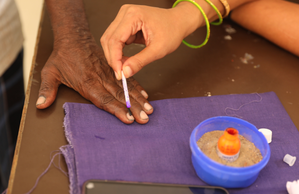MISSISSAUGA: The City of Mississauga has emerged as an ideal city for research into the social and other dimensions of diabetes, according to Adam Marsella, Director of External Affairs at Novo Nordisk Canada and Canadian lead of the ambitious Cities Changing Diabetes Program..
On June 9, Mississauga became a member of the program which allows it to understand its urban diabetic challenge and set goals and parameters to reduce the onset and severity of Type 2 Diabetes throughout the city.

Adam Marsella told the Weekly Voice that the program entails disease-mapping and planning intervention modes, dissemination of fact-based information and other methodologies to control the scourge of diabetes. “Our link with the University of Toronto’s campus in Mississauga also is a factor in the city becoming the centre of this program.”
He pointed out the Mississauga was also taking the lead with its novel food and beverage policy, its cycling network and promoting the use of stairwells in City facilities to get people to move – and in turn get healthier.
The Cities Changing Diabetes Program was launched in Copenhagen under the aegis of the Steno Diabetes Centre in association with University College of London and Novo Nordisk. The program today is partnering with nearly 40 cities around the world – potentially reaching 175 million people.
In Canada, Mississauga is the only city to have joined the program so far. “We welcome other urban centres also to join,” Marsella said. “Type 2 Diabetes is reaching epidemic proportions in certain areas and in Peel Region alone, one in six adults between the ages of 45 to 65 are affected.” It has also been noticed that ethnic groups like South Asian, Asian, Black, Arab, Hispanic and the Indigenous population are at an increased risk of developing Type 2 Diabetes.

“Our program stresses on education which can lead to behavioural changes like increased activity, avoiding a sedentary lifestyle and obesity, healthier dietary habits and to launch initiatives to ensure all-round health of individuals and communities.”

The company and the Mississauga Campus of the University of Toronto have invested about $40 million set up the Novo Nordisk Network for Healthy Populations at the UTM campus – a research hub which will focus on bringing together health experts to tackle diseases like Type 2 Diabetes.
“We are keen on establishing partnerships with community leaders, academia, health insurance and other corporate entitites so that there can be full collaboration across disciplines to map out problems and find solutions.”
Diabetes is a serious threat in Canada. If left untreated or not effectively managed, affected individuals can suffer grave problems, including loss of vision, kidney failure, amputations of limbs and various cardiovascular complications.

The Canadian Parliament passed a law C-327 in mid-June this year to establish a national framework for diabetes in the country that will improve prevention, management and research into diabetes.
Over the past several years, Diabetes Canada and MP Sonia Sidhu of Brampton South in Ontario, partnered together to advocate and urge governments to commit to supporting a nation-wide diabetes strategy for Canada, known as Diabetes 360°. It is interesting to note that Canada is now marking the 100th anniversary of the discovery of insulin which revolutionized the treatment of diabetes.
It is estimated that 11.5 million Canadians are living with diabetes or pre-diabetic conditions.
“It is in the area of education and proper interventions that the Cities for Diabetes program will play an important role,” Marsella pointed out.

























































